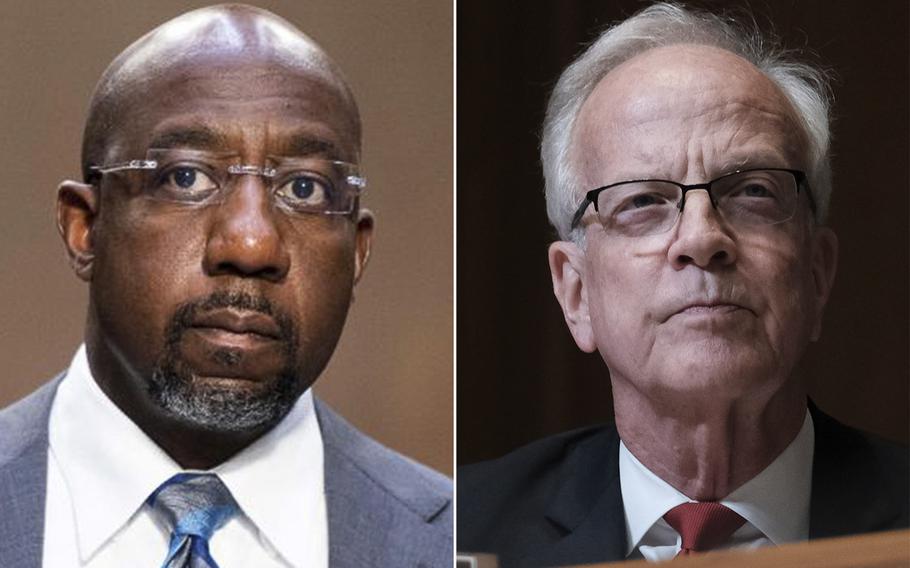
Sen. Raphael Warnock, D-Ga., left, and Sen. Jerry Moran, R-Kansas, introduced the Love Lives On Act. (Bill Clark/Pool/AFP via Getty Images/TNS, left, and Michael A. McCoy/Pool/The New York Times via AP)
(Tribune News Service) — Sen. Raphael Warnock is pushing bipartisan legislation that would allow spouses of dead military service members to keep certain Department of Veterans Affairs and Department of Defense benefits if they remarry.
The Georgia Democrat joined Kansas Republican Jerry Moran in introducing the Love Lives On Act last week. Under current law, a surviving spouse could lose benefits if they remarry before the age of 55.
“Our service members give us their best, and their spouses and other family members sacrifice a great deal in order for them to serve,” Warnock told the Ledger-Enquirer in an interview. “When those service members die in the course of their duty, their family should feel secure, no matter what happens in the future.”
What would the bill do? Key portions would:
— Allow surviving spouses to retain the Survivor Benefit Plan (SBP) and Dependency and Indemnity Compensation (DIC) if they remarry, regardless of age. The Survivor Benefit Plan provides up to 55% of a service member’s retirement pay to an eligible beneficiary after the service member dies. The Dependency and Indemnity Compensation is a tax-free monthly benefit to survivors.
— Redefine the term ‘surviving spouse’ to include those in same-sex marriages.
— Grant surviving spouses who remarry access to Commissary and Exchange benefits.
— Allow remarried surviving spouses with children access to electronic medical records, appointments, referrals, and prescription refills. The remarried surviving spouse would also be treated as a parent.
— Allow the surviving spouse to keep eligibility for education benefits under the Fry Scholarship and Dependents Education Assistance. The spouse would keep these benefits if their next marriage ended in death, divorce or annulment.
Surviving spouses would also be able to regain TRICARE benefits if their new marriage ends in death, divorce or annulment.
Why is this important?
The Tragedy Assistance Program for Survivors (TAPS), a national nonprofit that offers support to those grieving the loss of a military service member, estimates that 450,000 survivors are receiving Dependency and Indemnity Compensation. Of those, 75,000 are under the age of 55.
In Georgia, 19,000 surviving spouses receive the compensation and roughly 1,000 are under the age of 55.
The average age of a surviving military spouse is 25 — meaning they’d have to wait more than 30 years to remarry if they wanted to keep those benefits.
“Surviving spouses were military spouses first,” said Candace Wheeler, TAPS Director of Government & Legislative Affairs. “Many of them rely on these benefits. They are part of their financial planning for their family. ... If you’re a surviving spouse of a firefighter or police officer, (you) are allowed to remarry and not lose benefits. But our military surviving spouses are not afforded that.”
Tammy McCracken lost her husband David to brain cancer in 2011. She told the L-E the bill would benefit surviving spouses like her. The couple had three children, and their youngest is a college student in North Carolina.
The 53-year-old, who lives about an hour and a half northeast of Columbus in Tyrone, Georgia, said she recently began considering if she wants to find love again. But if McCracken found someone, she’d have to wait two years to marry.
“I can’t lose my benefits,” she said. “I’ve been on my own 11 years. I’ve not sought a relationship in over 11 years because this has been looming over my head. Before my husband passed, he told me ‘I hope you find happiness. I hope you find love again.’”
Similar legislation was proposed in 2016, but it failed to pass, according to congressional records. The bill is one of several tied to military service members and their families that Warnock has supported or introduced. In July, he proposed a slate of legislation to make quality housing more affordable for service members.
“This is ongoing work,” Warnock said of the bills. “One of the things that I learned as a pastor is that you can’t serve the people unless you listen to the people. ... That’s something I’ve committed to doing as a legislator.”
(c)2022 the Columbus Ledger-Enquirer (Columbus, Ga.)
Visit the Columbus Ledger-Enquirer at www.ledger-enquirer.com
Distributed by Tribune Content Agency, LLC.